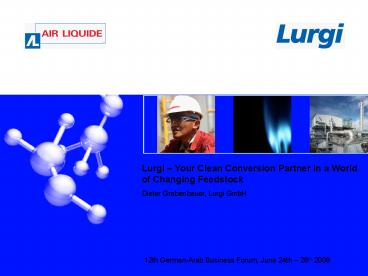Report on commercialisation: Lurgi's Methanol to Propylene GTP - PowerPoint PPT Presentation
1 / 21
Title:
Report on commercialisation: Lurgi's Methanol to Propylene GTP
Description:
2nd generation - BtL. Competition with food chain. Increase efficiency. CCS ... BTL: Intermediate & supplementary step. Economy of scale is limited by logistics ... – PowerPoint PPT presentation
Number of Views:502
Avg rating:3.0/5.0
Title: Report on commercialisation: Lurgi's Methanol to Propylene GTP
1
Lurgi Your Clean Conversion Partner in a World
of Changing Feedstock Dieter Grabenbauer, Lurgi
GmbH
12th German-Arab Business Forum, June 24th 26th
2009
2
Contents
- Company profile
- Motivation
- Market trends
- Market driver
- Solutions
- Outlook and conclusion
3
Air Liquide (Key Figures 2008)
- The Worlds Leader in Gases for Industry, Health
and the Environment - 43,000 employees
- Sales 13.1 billion
- Net profit 1.22 billion
- Operating in 75 countries
- Significant expansion in the Middle East, Russia
and Asia over the last 5 years - Approx. 30 of sales associated with
- - Refinery- Chemicals- Metals
4
Lurgi
- Lurgi was purchased by Air Liquide in summer
2007. - Lurgi is a leading technology company operating
worldwide in the fields of process engineering
and plant contracting. - The strength of Lurgi lies in innovative
technologies of the future focussing on
customized solutions for growth markets. - The technological leadership is based on
proprietary technologies and exclusively licensed
technologies in the areas - gas-to-petrochemical products and synthetic
fuels, - gas generation and treatment,
- refining,
- petrochemical intermediate and end products,
- polymers,
- biofuels,
- food and oleochemicals.
- From project development to the turn-key
construction of plants through to full plant
operation Lurgi globally engineers, builds and
commissions plant complexes from a single source
and under its overall responsibility.
5
Air Liquide/ LurgiWorldwide Engineering
Activities
6
Air Liquide/ LurgiWorldwide Engineering
Activities
Air Liquide / Lurgi presence in Middle East
7
How will the future look like?
8
Solutions for Environmental Respect
Avoid end of pipe emission control at final
consumerApplication of oxygen allows
densification of emissions and increased
efficiency
9
Key Trends
- Growing energy needs
- Heavier/ more sour crude
- Shift from crude oil to other carbon containing
feedstock - Increasing awareness for the environment (CO2,
SOx and NOx) - Local solutions (specific to a region) driven by
- Demand to reduce dependence from energy imports
- Growing respect for the environment
- Local development needs
- Resource valorization vs. resource export
(logistic effects)
10
Clean Conversion
11
The Contribution of Today's Technologies
- Deep Conversion (example below)
- Biomass valorization (long-term development)
- Valorization of coal
- CtC Coal to Chemicals
- CtL Coal to Liquid
12
Deep Conversion in Oil Refinery
13
Deep Conversion in Oil Refinery
Hydrotreater
Hydrocracker
Oil
CDU/ VDU
SDA
Hydrogen
VacuumResidue
Other Syngas Application
Gasification IslandH2 Plant
Vacuum Residue
CO2 (CCS ready)
LP-Steam
Steam
Hydrogen
PSA
Rectisolâ
MPGQuench
Raw Gas Shift
GasCooling
O2
H2SCO2
Claus
Air O2
Carbon Slurry
Process Water
MARS
ASU
Waste Water Treatment
Air
Metals/Ash
14
Hydrogen A Variety of Solutions
- The economics of the various technical solutions
are highly dependent on the local context (e. g.
cost of feed-stock, value of steam and
by-products, ) - CO2 economics will highly impact decisions.
Mitigation will include - CCS for gasification (Rectisol)
- CO2 reduction for SMR plants (reduction of up to
90 is feasible)
15
Challenges for the Future
- Valorizing Associated Gas off-shore
- Methanol FPSO (Floating Production Storage
Offtake) - Other FPSO applications (LNG, Others)
- Valorizing land-locked gas fields
- Challenge distance to the market
- Change from CCS to CCV (from storage to
valorizing) - EOR, limited geological application
- Re-conversion (requires carbon-free energy)
16
Ideal World
- Traditional
- Crude Oil Refinery CO2 ? Fuel CO2 ?,
SOX ? - Sulfur TodayCoalGas Gasification
Fuel CO2 ? - Residue CCS Sulfur
- TomorrrowLow energy molecules non-carbon based
energy Fuels (H2O, CO2)
- Technologies available
- Activation via oxygen
- Carbon hydrogenation (catalytic conversion)
Technologies ???
EXHAUST
17
Conclusions
- Solutions are local, but need to make sense in
global markets - Country goals
- Legislative issues
Electricity Fuels Heat Reduction Gas Chemicals
Oil and Gas Biomass Other Renewables Coal Nuclear
Technology
Changes in Behaviour
Political Vision
Challenge Foster cooperation between
Stakeholders to deliver an acceptable
investment solution acknowledging an
extraordinary uncertainty
18
Back-up
19
Drivers1. Substitution of High Priced Natural
Gas With a Low Valued Feedstock2. CCS - EOR
Deep Conversion in Oil Sands
CO2 (CCS ready)
Feedstock
LP-Steam
Feedstock Canadian Oil Sand
Air
97Hydrogen
Steam
Metha-nation
Rectisolâ
MPGQuench
Raw Gas Shift
GasCooling
ASU
O2
H2SCO2
Claus
Air O2
Carbon Slurry
Process Water
MARS
Waste Water Treatment
Metals/Ash
20
Utilisation of Biomass
Transportation Radius
Energy densityGJ/m3
Energy efficiency
Straw 1.5
25 - 75 km
Pyrolysis/ Torrefaction
90
Slurry 20
Regional intermediate fuel production
-
250 - 500 km (rail/barge)
50
- Entrained Flow
- Fischer-Tropsch
- MeOH
Central syngas and fuel production
Diesel 36
- Utilise the whole plant, not only the fruits
(wood chips and straw, ) - BTL Intermediate supplementary step
- Economy of scale is limited by logistics
21
Alternative Routes - Coal to Propylene China
- Valorisation of land-locked coal is driven by
logistics High Value Products - 2 Complexes under Construction































